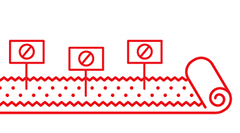In the mid-1990s, an organization called the National Smokers’ Alliance sprung up in the U.S. to fight new laws to restrict smoking. Although the group seemed to have been started by disgruntled smokers, it had, in fact, been created by Philip Morris Tobacco.
By masking its role in what seemed to be a grassroots movement, the company was “astroturfing.” Used by corporations to influence public policy, the practice is now being employed to get people to buy products, says Jenna Jacobson, a PhD candidate at the Faculty of Information. Companies identify social media “influencers” and pay them to promote their brands to followers. Not all influencers disclose the relationship, though – hence: astroturfing. “One objection is that audiences are being duped,” she says.
Recent Posts
U of T’s Feminist Sports Club Is Here to Bend the Rules
The group invites non-athletes to try their hand at games like dodgeball and basketball in a fun – and distinctly supportive – atmosphere
From Mental Health Studies to Michelin Guide
U of T Scarborough alum Ambica Jain’s unexpected path to restaurant success
A Blueprint for Global Prosperity
Researchers across U of T are banding together to help the United Nations meet its 17 sustainable development goals





